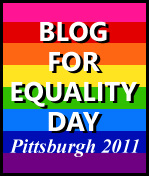The Post-Gazette's "Next Page" featured a fascinating article on the implementation of deliberative polling around marriage issues.
My interpretation of this process is that it strives to create an informed voter, rather than create systemic changing dialogue grounded in consensus.
At the core of deliberative polling lies the belief that to develop an informed opinion citizens need two things: access to balanced information and the opportunity to engage in deliberation with a range of alternative views.
Sounds interesting. Proponents of gay-rights have long argued that when our opponents get to know us, they will experience our issues in a personal way that should overcome the us/them dichotomy.
Saturday's event is sort of an all-day education session. Participants have homework, they engage in small groups and they learn the facts about the history of marriage in our culture. I'm going to read that booklet myself. At the end of the day, participants will be polled for their individual views, not a collective decision. That polling data will be made public.
The poll is designed to have a policy impact, presumably by turning out informed voters (and informing their networks). I wonder about the choice of this issue. Neither Presidential candidate is in favor of gay marriage and the issue is fairly dormant in Pennsylvania. Equal protection would seem more fitting since it has legislative life. However, those pesky State House elections remind us of the importance of retaining as many progressive reps as possible. As progressive as Pennsylvania goes.
This strikes me more as an intellectual exercise on a hot button issue, but not necessarily a Pennsylvania issue.





